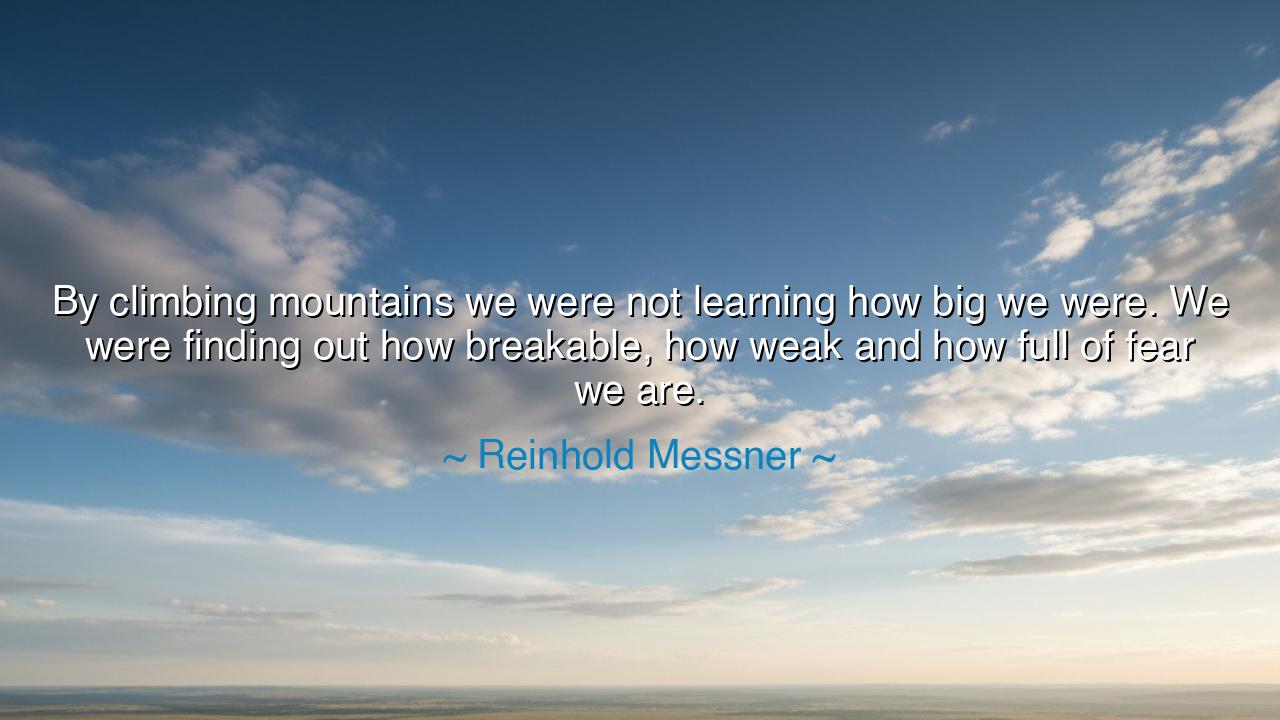
By climbing mountains we were not learning how big we were. We
By climbing mountains we were not learning how big we were. We were finding out how breakable, how weak and how full of fear we are.






There are words that rise from the silence of the mountains, carrying with them the breath of eternity. Reinhold Messner, one of the greatest mountaineers to walk the earth, spoke such words when he said: “By climbing mountains we were not learning how big we were. We were finding out how breakable, how weak and how full of fear we are.” In these few lines, Messner does not speak of conquest or glory, but of humility — of the revelation that comes when man stands face to face with the vastness of nature and the limits of his own strength. His is not the boast of one who triumphed over peaks, but the confession of one who discovered the smallness of the human heart before the grandeur of creation.
The meaning of this quote reaches far beyond the world of mountaineering. It is a lesson in the nature of courage and the illusion of pride. Many believe that climbing mountains — literal or symbolic — is about proving one’s power, demonstrating mastery over nature or circumstance. But Messner, who scaled Everest without oxygen and lost his brother to the Himalayas, came to understand that the true summit is not the mountain’s crown, but the awakening of the soul that occurs when one realizes how fragile life truly is. In the thin air of high places, where each breath is borrowed and every step could be the last, a man does not find his greatness — he encounters his frailty.
This truth is ancient. The philosophers of old often spoke of the path to wisdom as a journey upward, a climb toward light and understanding. Yet, every climber — whether of mountains or of the soul — learns that the higher one ascends, the more vulnerable one becomes. The body grows weary, the air thins, and illusions fall away. It is then that humility, not pride, becomes the climber’s companion. Reinhold Messner’s words echo the same wisdom found in the meditations of mystics and saints: that true strength lies in knowing one’s weakness, and true courage is not the absence of fear, but the decision to continue despite it.
Consider the story of Sir Edmund Hillary and Tenzing Norgay, the first to reach the summit of Everest. Their achievement was heralded across the world as a triumph of human will. Yet Hillary himself once said, “It is not the mountain we conquer, but ourselves.” After enduring brutal winds, crushing cold, and near death, he realized that the mountain was not his enemy — his own fear, exhaustion, and doubt were. Like Messner, he discovered that to climb is not to become mighty, but to become aware — aware of mortality, of dependence on others, and of the delicate balance between ambition and surrender.
What Messner teaches is that the mountains do not flatter us; they strip us bare. They remove the noise of civilization, the comfort of certainty, and the arrogance of control. Up there, amid silence and danger, a man is reminded that he is dust, that his courage trembles, and that his will is only as strong as the next heartbeat. Yet it is in this stripping away that truth is born. To face fear and weakness honestly is to encounter authenticity — the part of ourselves that neither pride nor pretense can touch. Thus, climbing becomes not an act of conquest, but of revelation.
There is also a profound paradox in his words: that through acknowledging our weakness, we become stronger. Those who deny their fear are enslaved by it; those who accept it are freed. The climber who knows his fragility respects the mountain and lives to climb again. So too in life: those who embrace their limits gain wisdom and endurance, while those who imagine themselves invincible are soon broken. Messner reminds us that humility is not defeat, but a form of enlightenment — the clear vision that comes when the ego falls silent and the soul begins to listen.
Let this teaching be passed on to all who seek greatness. Whatever your mountain — whether it is art, leadership, love, or the struggle to understand yourself — do not climb to prove your power, but to discover your truth. Let the hardships humble you. Let your failures teach you reverence. For the highest summit is not a place upon the earth, but a condition of the heart — when you finally see that in your weakness lies your humanity, and in your fear, the chance to grow. As Reinhold Messner teaches, the climb is not about reaching the top, but about descending wiser, gentler, and more awake — carrying within you the quiet knowledge that you are small before the universe, yet capable of rising within it.






AAdministratorAdministrator
Welcome, honored guests. Please leave a comment, we will respond soon